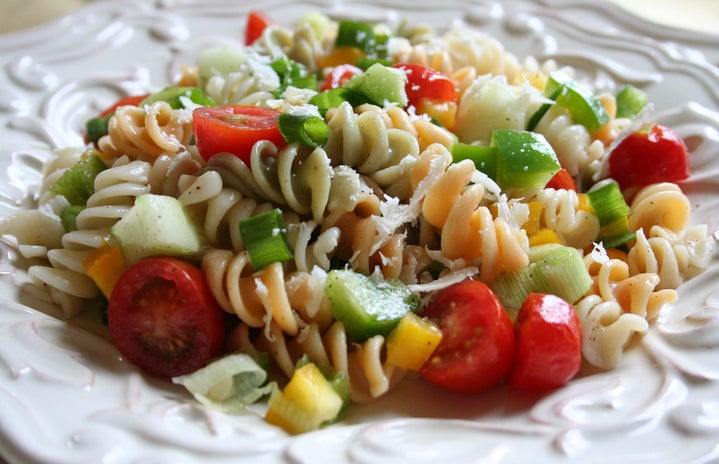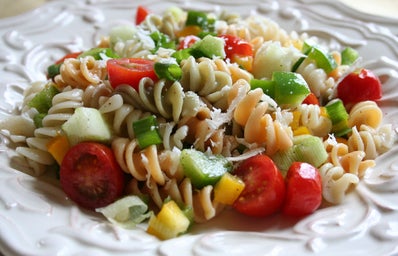Food is a necessary part of our day. It is the fuel that allows us to function, stay healthy, and enjoy our lives. So, why do we have such complicated relationships with food? The answer is simple. Society has created this expectation of a “perfect” body type while demonizing certain foods to shame us into starving ourselves and scrutinizing everything we eat. Everything from canola oil, to milk, to eggs has been made out to be detrimental to our health. And for what?
The reality is you need food to survive. Your body needs sugar, fat, carbohydrates, and protein in order to function properly. We need to stop criticizing our cravings and the foods we enjoy and start looking at them as nourishment. Easier said than done, I know. But I’ve been working hard on this for a while now and I thought I’d share some of the strategies that have helped me.
Disclaimer: Though these tips have helped me, everyone’s journey is different. Consult a doctor or nutritionist for professional help regarding significant dietary changes. This article is meant to help with small mindset changes, not fix any serious health or eating issues. Please take care of yourself. If you are in need of professional assistance, please consult this link.
1. Stop Restricting, Start Adding
One of the biggest, and possibly most challenging adjustments I’ve made is eliminating the notion of “good” foods and “bad” foods. No food is inherently good or bad. Stop restricting certain foods and instead focus on adding. Enjoy your favorite macaroni and cheese, but maybe stir in some chicken and broccoli. Have a frozen pizza, but throw on some of your favorite veggies. Make some delicious pancakes for breakfast, but maybe add some berries or nuts. Stop trying to tell yourself you can’t eat the things you enjoy. Change your mindset and work on viewing all food as neutral.
2. Make Food Fun
For a while, I was skipping meals. I started viewing eating as a chore, making it hard to get up the motivation to actually have a meal. To fix this, I reframed what a meal could be. I started finding exciting recipes that allowed me to explore new flavors and cooking techniques. I also put more effort into packing fun lunches. I bought a little bento box container and started buying foods that I could turn into little adult Lunchables. It made it fun to make and eat lunch every day. I also started keeping a larger variety of balanced snacks around. I realized that to fill the void of not eating a meal, I turned to mindlessly snacking. So, to help make this habit more productive, I started getting a wider variety of snacks like different trail mixes, dried fruit, and charcuterie board materials to make mini boards when I felt snacky. Not only did this help me to make sure my snacks were more nutrient-dense, but it also helped me to be more mindful while eating because I wasn’t bored by what I was snacking on.
3. Honor Your Cravings
Your body knows when it’s hungry and when it’s not. I used to ignore my hunger cues because it “wasn’t time to eat.” That is not healthy. Your body will tell you what it needs, you just have to learn to listen. Also, eat what you’re hungry for. If you want a cheeseburger and fries, eat a cheeseburger and fries. Your body will not always crave a burger and fries, but it’s good to honor that when it does. Show your body some love and attention by giving it what it needs at the moment.
4. Keep A Food Journal
One thing that really helped me was to keep a daily journal about what I ate and how it made me feel. I talked about the new recipes I tried and how much I enjoyed my lunches that day. I also wrote about the tough parts, like when I felt like skipping lunch or when I slipped into a restrictive mindset. It helped me recognize patterns to predict and manage bad days.
5. Be Kind To Yourself
Making sustainable, long-term changes to your mindset takes time. It is okay to have setbacks. It is okay to slip up a bit. Be patient and show yourself grace. Remember that part of taking care of yourself and improving your life is taking steps back sometimes. Don’t be hard on yourself. Just take it one meal at a time and celebrate progress.
6. Ignore Toxic “Wellness” Trends
Social media is a breeding ground for fearmongering and toxic “health” movements. Ignore all of it. Instead, follow certified dietitians who actually know what they are talking about. TikTok creators like @stephgrassodietitian and @nutritionbykylie are registered dietitians who promote balanced, intuitive eating and avoid buying into unhealthy trends. Also, look into other resources, like WiseBodi, a company dedicated to promoting intuitive eating and body neutrality, run by certified health coaches. Among their many services, they produce a free podcast tackling topics like body image, social media, and intuitive eating in social scenarios.
Everyone’s journey in improving their relationship with food looks different. So be kind to yourself and your body, and know you’re never in this alone. You got this!
If you or someone you know has an eating disorder and needs help, call the National Eating Disorders Association helpline at 1-800-931-2237, text 741741, or chat online with a Helpline volunteer here.



